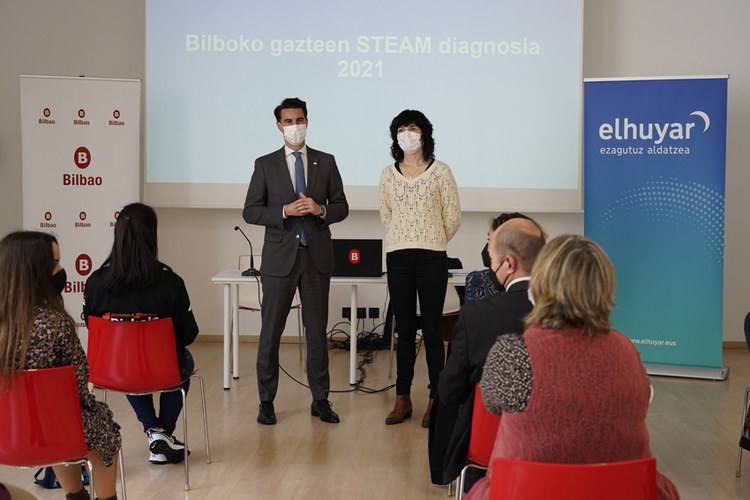Presented the 'STEAM Diagnosis' of Bilbao's youth
2021/05/17 STEAM-Hezkuntza (Elhuyar Zientzia)
 400
400
The Bilbao City Council and Elhuyar present the results of the study STEAM (Science, Technology, Engineering, Art and Mathematics) for young people of Bilbao. The report was presented by Xabier Ochandiano, councilor of the Area of Economic Development, Trade and Employment of the City of Bilbao, and Garazi Andonegi Beristain, coordinator of the Science Unit of Elhuyar. This is an ambitious report that reflects interest in students' vocation for science and technology and professions and STEM issues.
The results of 1,029 young people from 3rd and 4th ESO from 14 schools in Bilbao were collected. 47.9% of participants were girls, 48.4% boys and 3.7% non-binary.
The main conclusions were as follows:
- Traditional gender stereotypes influence the determination of youth's interest in this matter. In general, girls have more interest in varied topics, while boys focus on specific issues, much more. Science and technology have a limited space between all issues that interest girls. As for the interests of the guys, they are the most numerous.
- Gender stereotypes also influence the choice of future offices. Girls have selected professions primarily related to teaching and health sciences, while boys have selected topics related to technology.
- The degree of interest in subjects is generally low. Girls have shown greater interest in art and biology and boys have shown greater interest in computer science and technology.
- According to young people, STEM professionals are hardworking, fast, head-dressed, with a lot of patience and curiosity. Some of these qualifiers are very common in the description of good students. In the opinion of many young people, to work in these jobs it is necessary to follow a long, demanding and difficult learning process. As a result, the likelihood of applying for other types of studies increases.
- As for future STEM work, girls and boys recognize a different degree of competence: 46.9% of boys think they will work in this sector, 29% of girls and 26.3% of non-binary.
- Girls and boys have a very different vision of how STEM professionals live: boys value it higher (6.7) and have more interest in working in the future on STEM. 43.1% of boys and 24.6% of girls show interest in working in STEM.
- In general, for young people, the working conditions of women and men dedicated to science and technology are different, but they have a more positive view of Bilbao, as they have mitigated these differences.
- Approximately half of young people (46.5%) do not know the Bilbao industry and do not seem particularly attractive to work in the industry of the region. However, some young people, both girls and boys, have linked industry and the work of the region with positive aspects.
In general, the results of the study show that in Bilbao the knowledge of STEM activity is low, with a lower scientific-technical vocation among girls.
The results of the questionnaire are collected in:
Audiovisual production:STEAM diagnosis of Bilbao.
Full report with all data




